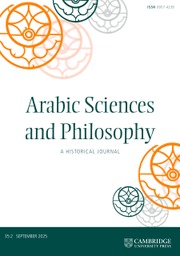Article contents
THE SIMPLICITY OF SELF-KNOWLEDGE AFTER AVICENNA
Published online by Cambridge University Press: 10 August 2018
Abstract
Alongside his much-discussed theory that humans are permanently, if only tacitly, self-aware, Avicenna proposed that in actively conscious self-knowers the subject and object of thought are identical. He applies to both humans and God the slogan that the self-knower is “intellect, intellecting, and object of intellection (‘aql, ‘āqil, ma‘qūl)”. This paper examines reactions to this idea in the Islamic East from the 12th-13th centuries. A wide range of philosophers such as Abū l-Barakāt al-Baghdādī, Faḫr al-Dīn al-Rāzī, al-Šahrastānī, Šaraf al-Dīn al-Mas‘ūdī, al-Abharī, al-Āmidī, and Naṣīr al-Dīn al-Ṭūsī raised and countered objections to Avicenna's position. One central problem was that on widely accepted definitions of knowledge – according to which knowledge is representational or consists in a relation – it seems impossible for the subject and object of knowledge to be the same. Responses to this difficulty included the idea that a self-knower is “present” to itself, or that here subject and object are different only in “aspect (i‘tibār)”.
Résumé
Au cours de son exposé de sa thèse si disputée selon laquelle les êtres humains sont de manière permanente, fût-ce tacitement, conscients d'eux-mêmes, Avicenne suggère que dans les auto-connaissants activement conscients, le sujet et l'objet de la pensée sont identiques. Il applique alors – à la fois aux êtres humains et à Dieu – le slogan affirmant que l'auto-connaissant est « intellect, intelligeant et intelligé » (‘aql, ‘āqil, ma‘qūl). Cet article examine les réactions à cette idée dans l'Est du monde islamique durant les 12ème et 13ème siècles. Un grand nombre de philosophes, tels Abū l-Barakāt al-Baghdādī, Faḫr al-Dīn al-Rāzī, al-Šahrastānī, Šaraf al-Dīn al-Mas‘ūdī, al-Abharī, al-Āmidī et Naṣīr al-Dīn al-Ṭūsī ont en effet soulevé des objections à l'encontre de la position d'Avicenne et ont apporté des réponses à ces objections. Un problème central a consisté dans le fait que selon des définitions généralement acceptées de la connaissance – d'après lesquelles la connaissance est représentationnelle ou consiste dans une relation –, il paraissait impossible pour le sujet et l'objet de la connaissance d’être le même. Des réponses à cette difficulté ont mis en place l'idée que tout autoconnaissant est « présent » à soi, ou que dans ce cas, le sujet et l'objet sont différents seulement selon l’ « aspect » (i‘tibār).
- Type
- Research Article
- Information
- Copyright
- Copyright © Cambridge University Press 2018
- 2
- Cited by


